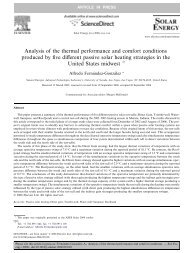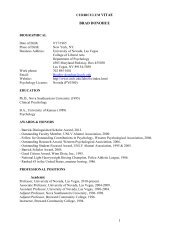2013 Conference Proceedings - University of Nevada, Las Vegas
2013 Conference Proceedings - University of Nevada, Las Vegas
2013 Conference Proceedings - University of Nevada, Las Vegas
- No tags were found...
You also want an ePaper? Increase the reach of your titles
YUMPU automatically turns print PDFs into web optimized ePapers that Google loves.
their ability to teach the mathematical topics covered in the course which supports Anderson andPiazza’s findings (1996). For instance, participants statedI think, in general, most <strong>of</strong> the experiences in this course have enhanced myconfidence and enthusiasm for mathematics. Being encouraged to work with out<strong>of</strong>-the-boxalgorithms has expanded my perceived horizons and opened up a newfield <strong>of</strong> interest for me.I used to view all mathematics very negatively because I was never good at it.However, in here by using visual manipulatives and other methods I was able tobetter understand mathematics, therefore I can feel more confident aboutit….because this class gave me a better understanding <strong>of</strong> mathematics I am able toenjoy it more, instead <strong>of</strong> being stressed out by it.While the results <strong>of</strong> this study are not intended to be generalized, it may be used to informpre-service teacher preparation programs as well as point to future directions to pursue inresearch on this topic. After investigating the results <strong>of</strong> this study, one area for future studieswould be to examine how and why pre-service teachers assimilate new ideas to fit existingbeliefs rather than accommodate their existing beliefs to internalize new ideas. Moreover, sincethis study focused on perturbing a variety <strong>of</strong> mathematical beliefs and found that those perturbedmost were seemingly impacted the most, future studies might focus on perturbing specificmathematical beliefs throughout a course to observe the effect on belief structure.ReferencesAnderson, D., & Piazza, J. (1996). Changing beliefs: Teaching and learning mathematics inconstructivist preservice classrooms. Action in Teacher Education, 18(2), 51-62.Ball, D. B. (1988). Unlearning to teach mathematics. For the Learning <strong>of</strong> Mathematics, 8(1), 40-48.Ball, D. B. (1990). Breaking with experience in learning to teach mathematics: The role <strong>of</strong> apreservice methods course. For the Learning <strong>of</strong> Mathematics, 10(2), 10-16.Ball, D. B. (1996). Teacher learning and the mathematics reforms: What we think we know andwhat we need to learn. Phi Delta Kappan, 77(7), 500-508.Burnaford, G., Fischer, J., & Hobson, D. (2001). Teachers doing research: The power <strong>of</strong> actionthrough inquiry. Mahwah, NJ: Lawrence Erlbaum Associates Inc.Calderhead, J., & Robson, M. (1991). Images <strong>of</strong> teaching: Student teachers’ early conceptions <strong>of</strong>classroom practice. Teaching & Teacher Education, 7, 1-8.Cooney, T. J. (1999). Conceptualizing teacher’s ways <strong>of</strong> knowing. Educational Studies inMathematics, 38, 163-187.Ernest, P. (2002). Empowerment in mathematics education. Philosophy <strong>of</strong> MathematicsEducation Journal, 15. Retrieved July 15, 2012 fromhttp://people.exeter.ac.uk/PErnest/pome15/empowerment.htmFennema, E., & Sherman, J. (1977). Sex-related differences in mathematics achievement, spatialvisualization, and affective factors. American Educational Research Journal, 14, 51-71.<strong>Proceedings</strong> <strong>of</strong> the 40 th Annual Meeting <strong>of</strong> the Research Council on Mathematics Learning <strong>2013</strong> 66




